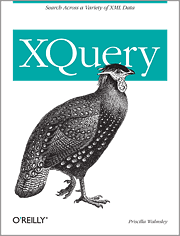Description
The functx:between-inclusive function returns true if the $value is between $minValue and $maxValue, inclusive. If the values are of incomparable types, an error will be raised. If $value is the empty sequence, the function returns false.
Arguments and Return Type| Name | Type | Description |
|---|
$value |
xs:anyAtomicType? |
the value to be tested |
$minValue |
xs:anyAtomicType |
the minimum value |
$maxValue |
xs:anyAtomicType |
the maximum value |
| return value |
xs:boolean |
XSLT Function Declaration| See XQuery definition. | <xsl:function name="functx:between-inclusive" as="xs:boolean"
xmlns:functx="http://www.functx.com">
<xsl:param name="value" as="xs:anyAtomicType?"/>
<xsl:param name="minValue" as="xs:anyAtomicType"/>
<xsl:param name="maxValue" as="xs:anyAtomicType"/>
<xsl:sequence select="
$value >= $minValue and $value <= $maxValue
"/>
</xsl:function>
|
Examples| XPath Example | Results | Explanation |
|---|
functx:between-inclusive(55, 1, 1000) |
true |
functx:between-inclusive(1, 1, 1000) |
true |
functx:between-inclusive(1200, 1, 1000) |
false |
functx:between-inclusive('b', 'b', 'd') |
true |
functx:between-inclusive(xs:date('2004-10-31'),
xs:date('2004-10-15'),
xs:date('2004-11-01')) |
true |
functx:between-inclusive('a', 1, 1000) |
Error |
Strings cannot be compared to integers. |
See AlsoHistory |
Recommended Reading: 
|

